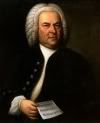 This text provided Johann Sebastian Bach with the basis for one of his most famous and well-loved cantatas, BWV 82 'Ich habe genug'. It was originally composed for solo bass voice (Bach also made a transcription for soprano) and features a prominent oboe part (a flute in the soprano version). It consists of three arias which differ in character from each other and are connected together by two short recitatives. The opening aria features, to my ears, a perfect musical evocation of yearning, portrayed by strings, oboe and the voice. The second is a lullaby for this weary soul, while the third a confident joy in the face of death. It's a simple progression of ideas put across musically, each bridged by recitatives which expertly change the mood. It's also a piece of music that our two children have grown up with, one of the pieces we most often play while preparing for bedtime - they both like it (as far as we can tell!) and seem sensitive to differences in performance
This text provided Johann Sebastian Bach with the basis for one of his most famous and well-loved cantatas, BWV 82 'Ich habe genug'. It was originally composed for solo bass voice (Bach also made a transcription for soprano) and features a prominent oboe part (a flute in the soprano version). It consists of three arias which differ in character from each other and are connected together by two short recitatives. The opening aria features, to my ears, a perfect musical evocation of yearning, portrayed by strings, oboe and the voice. The second is a lullaby for this weary soul, while the third a confident joy in the face of death. It's a simple progression of ideas put across musically, each bridged by recitatives which expertly change the mood. It's also a piece of music that our two children have grown up with, one of the pieces we most often play while preparing for bedtime - they both like it (as far as we can tell!) and seem sensitive to differences in performanceThere is a bewildering number of recordings available of this cantata. I've picked out three which I find myself returning to more often than the others, but it is almost entirely a matter of personal taste. It's music that players and singers tend to rise to the challenge of in my experience. The big gap in my collection is any version by Dietrich Fischer Dieskau - who recorded three versions as you can see from his short biography at bach-cantatas.com. The earliest recording I have is by Hans Hotter on EMI. Recorded in 1950, Hotter's vocal performance is extraordinary, but it's not a version I listen to very often as the instrumental accompaniment and overall feel is a little offputting in its romanticism. The most recent is diametrically opposed to Hotter's version, featuring a lighter, more lyrical touch from bass Stephan MacLeod on the ATMA label. as part of their traversal of Bach's cantatas singing one voice per part (a performance decision which doesn't apply in the case of a solo cantata like this!). I like this very much for its freshness and MacLeod puts in a very good performance
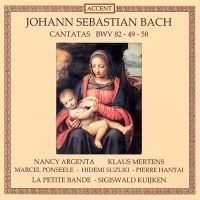 My favourite recording is the CD made by Sigiswald Kuijken and La Petite Bande with bass Klaus Mertens from 1993. Marcel Ponseele puts in a particularly strong performance as the oboist on this version and Mertens is totally responsive to the text, managing the various transitions in mood and effect. Sadly, this now appears to be out of print - neither Amazon nor MDT have it listed, which is something that's happened in the last couple of years. We can hope that Accent are considering re-releasing it. Kuijken recently re-visited this cantata with bass Jan van der Crabben as part of his partial cantata cycle. Van der Crabben's voice doesn't quite match up to Mertens for me, but he certainly doesn't let down the wonderful accompaniment by oboist Patrick Beaugirard and the other members of La Petite Bande. The sound is wonderfully clear and intimate - an intimacy which is also present in van der Crabben's performance. It's a recording that I keep returning to with increasing pleasure - as with the other instalments in Kuijken's mini cycle.
My favourite recording is the CD made by Sigiswald Kuijken and La Petite Bande with bass Klaus Mertens from 1993. Marcel Ponseele puts in a particularly strong performance as the oboist on this version and Mertens is totally responsive to the text, managing the various transitions in mood and effect. Sadly, this now appears to be out of print - neither Amazon nor MDT have it listed, which is something that's happened in the last couple of years. We can hope that Accent are considering re-releasing it. Kuijken recently re-visited this cantata with bass Jan van der Crabben as part of his partial cantata cycle. Van der Crabben's voice doesn't quite match up to Mertens for me, but he certainly doesn't let down the wonderful accompaniment by oboist Patrick Beaugirard and the other members of La Petite Bande. The sound is wonderfully clear and intimate - an intimacy which is also present in van der Crabben's performance. It's a recording that I keep returning to with increasing pleasure - as with the other instalments in Kuijken's mini cycle.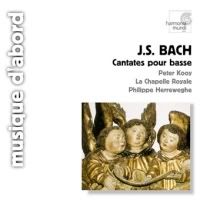 Ponseele also played oboe for Philippe Herreweghe's 1991 recording with Dutch bass Peter Kooy. In the absence of the 1993 Kuijken version, this would probably be my first choice, although it's a close decision. There is a beautiful sheen to Herreweghe's version, a luminous quality to the strings, which still keep a rhythmic discipline that prevents the sound from becoming too smooth. The oboe and strings in the opening aria have a tender, yearning quality and a firm forward momentum into the rest of the cantata. Kooy is a particularly accomplished singer of Bach's sacred music: he is the bass favoured by Masaaki Suzuki (who is yet to record this cantata in his cycle) and is an experienced soloist in the passions: here, he brings a restrained emotional depth to the performance which is particularly affecting. The disc also includes two other cantatas for solo bass, each performed to a similarly high standard.
Ponseele also played oboe for Philippe Herreweghe's 1991 recording with Dutch bass Peter Kooy. In the absence of the 1993 Kuijken version, this would probably be my first choice, although it's a close decision. There is a beautiful sheen to Herreweghe's version, a luminous quality to the strings, which still keep a rhythmic discipline that prevents the sound from becoming too smooth. The oboe and strings in the opening aria have a tender, yearning quality and a firm forward momentum into the rest of the cantata. Kooy is a particularly accomplished singer of Bach's sacred music: he is the bass favoured by Masaaki Suzuki (who is yet to record this cantata in his cycle) and is an experienced soloist in the passions: here, he brings a restrained emotional depth to the performance which is particularly affecting. The disc also includes two other cantatas for solo bass, each performed to a similarly high standard.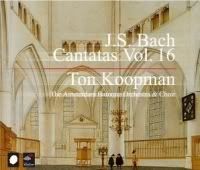 One recording of Klaus Mertens performing this cantata is still available, which he made in 2001 with Ton Koopman as part of the Dutch conductor's complete cycle of Bach cantatas. It's a stylish performance - Koopman's organ accompaniment is carried off with a good deal of panache and Mertens, while not to my ears as sublime as he was eight years previously, rises to Koopman's stylistic requirements with great credit. The central 'lullaby' aria 'Schlummert ein..' is taken at a tempo which I suspect some will find a little brisk, but the interweaving of Mertens' voice, Koopman's organ, the continuo and strings is beautifully set out and fascinating to listen to. The final aria shows Koopman and Mertens at their strongest - vivid, bright and with a driving intensity.
One recording of Klaus Mertens performing this cantata is still available, which he made in 2001 with Ton Koopman as part of the Dutch conductor's complete cycle of Bach cantatas. It's a stylish performance - Koopman's organ accompaniment is carried off with a good deal of panache and Mertens, while not to my ears as sublime as he was eight years previously, rises to Koopman's stylistic requirements with great credit. The central 'lullaby' aria 'Schlummert ein..' is taken at a tempo which I suspect some will find a little brisk, but the interweaving of Mertens' voice, Koopman's organ, the continuo and strings is beautifully set out and fascinating to listen to. The final aria shows Koopman and Mertens at their strongest - vivid, bright and with a driving intensity.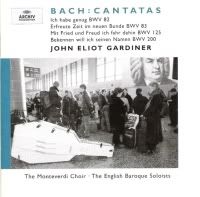 Two honourable mentions to finish this post. John Eliot Gardiner's live recording from his cantata pilgrimage in 2000 is available on Deutsche Grammophon, featuring bass Peter Harvey. It makes a nice contrast to Koopman, in that Gardiner slows the pace of 'Schlummert ein..' down noticeably. Because it's live it doesn't have the sheen of perfection present in many of the studio recordings, which is not something that concerns me and gives an 'edge' which I like very much. I'm a big fan of Gardiner's cantatas - not least because his recordings were the first I heard - and Peter Harvey as well and both are in their usual good form here. The contrasts are especially rewarding, the serenity of the lullaby the calm before Gardiner whips up a storm in the final aria.
Two honourable mentions to finish this post. John Eliot Gardiner's live recording from his cantata pilgrimage in 2000 is available on Deutsche Grammophon, featuring bass Peter Harvey. It makes a nice contrast to Koopman, in that Gardiner slows the pace of 'Schlummert ein..' down noticeably. Because it's live it doesn't have the sheen of perfection present in many of the studio recordings, which is not something that concerns me and gives an 'edge' which I like very much. I'm a big fan of Gardiner's cantatas - not least because his recordings were the first I heard - and Peter Harvey as well and both are in their usual good form here. The contrasts are especially rewarding, the serenity of the lullaby the calm before Gardiner whips up a storm in the final aria.Finally, I only have one recording of the transcription Bach made for the soprano voice (BWV 82a) - by Karina Gauvin with Bernard Labadie and Les Violons du Roy from 2004 - and it always takes my ears a little while to adjust! Gauvin's silvery voice sets the music in a very different light to a bass as you might imagine and lends the cantata a more ethereal quality. I'm not convinced by it, but that's probably because I haven't heard enough recordings to come to any firm conclusions.
I've missed out lots of others. I liked Thomas Quasthoff's version, but it's a while since I heard it; and I've not heard the recording by Matthias Goerne which is very well thought of. And as I said earlier, I don't have any versions by Fischer-Dieskau - as I never tire of hearing this music, I can see my modest collection of recordings only increasing over time...
No comments:
Post a Comment